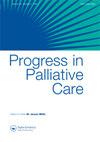Initial screening of compassion fatigue in a hospice palliative care team: validation of the silencing response scale
IF 0.8
Q4 PUBLIC, ENVIRONMENTAL & OCCUPATIONAL HEALTH
引用次数: 0
Abstract
Aims and Objectives: This study aimed to validate a silencing response scale (SRS) for the initial screening of compassion fatigue in hospice palliative care teams (HPCT) members. Background: The silencing response is a defense mechanism that diverts caregivers’ attention from painful and difficult situations. This is an early stage of compassion fatigue. During the silencing response stage, the ability of HPCTs to listen to patients’ requests for assistance decreases, and their professional performance related to tasks and care provision weakens. Design: This study with psychometric evaluation was designed to validate the SRS for the initial screening of compassion fatigue among HPCTs. Methods: After translation-back translation and content validity indexing, 236 HPCT members working in hospice agencies designated by the Korean Ministry of Health and Welfare participated in this survey. The data were analyzed using SPSS and AMOS software. Results: The SRS developed in this study is a self-evaluation tool that employs a five-point Likert scale with 16 items: eight for disinterest, four for situation avoidance, and four for fear. The SRS met the criteria for construct, convergent, and criterion validity. The Cronbach's α for the full SRS was .87. Conclusions: To ensure HPCT well-being, prevention rather than burnout recovery should be prioritized. The SRS developed in this study can be used to screen for compassion fatigue at an early stage to prevent burnout and severe compassion fatigue among HPCT members.安宁疗护缓和疗护团队对同情疲劳的初步筛选:沉默反应量表的验证
目的与目的:本研究旨在验证沉默反应量表(SRS)对安宁疗护缓和疗护团队(HPCT)成员同情疲劳的初步筛选。背景:沉默反应是一种防御机制,它将照顾者的注意力从痛苦和困难的情况中转移开来。这是同情疲劳的早期阶段。在沉默反应阶段,hpct倾听患者帮助请求的能力下降,与任务和护理提供相关的专业表现减弱。设计:本研究采用心理测量评估法,旨在验证SRS对高同情心治疗人员同情疲劳的初步筛查效果。方法:对236名在韩国保健福利部指定的安宁疗护机构工作的HPCT成员进行反译和内容效度索引调查。采用SPSS和AMOS软件对数据进行分析。结果:本研究开发的SRS是一种自我评价工具,采用李克特五点量表,共16个项目:无兴趣8个,情境回避4个,恐惧4个。SRS符合结构、收敛性和效度标准。全SRS的Cronbach's α为0.87。结论:为了确保HPCT的健康,应优先考虑预防而不是倦怠恢复。本研究开发的SRS可用于早期同情疲劳筛查,以防止HPCT成员的倦怠和严重同情疲劳。
本文章由计算机程序翻译,如有差异,请以英文原文为准。
求助全文
约1分钟内获得全文
求助全文
来源期刊

PROGRESS IN PALLIATIVE CARE
PUBLIC, ENVIRONMENTAL & OCCUPATIONAL HEALTH-
CiteScore
2.60
自引率
11.80%
发文量
24
期刊介绍:
Progress in Palliative Care is a peer reviewed, multidisciplinary journal with an international perspective. It provides a central point of reference for all members of the palliative care community: medical consultants, nurses, hospital support teams, home care teams, hospice directors and administrators, pain centre staff, social workers, chaplains, counsellors, information staff, paramedical staff and self-help groups. The emphasis of the journal is on the rapid exchange of information amongst those working in palliative care. Progress in Palliative Care embraces all aspects of the management of the problems of end-stage disease.
 求助内容:
求助内容: 应助结果提醒方式:
应助结果提醒方式:


